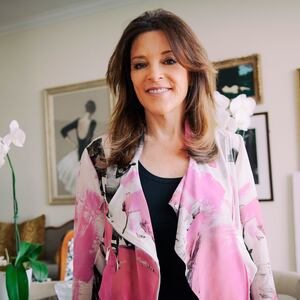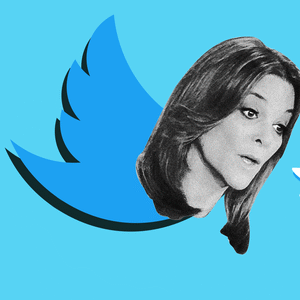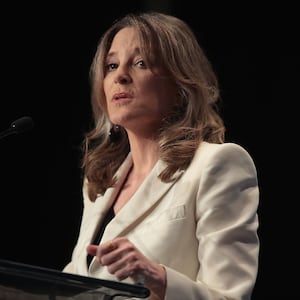On Monday evening, a crowd of several hundred people milled around the art-deco lobby of the Saban Theatre, an “entertainment industry temple” in Beverly Hills, surrounded by blue light and a floor full of pink balloons. Three guests came in flower crowns. A fourth wore Mickey Mouse ears decked out as giant purple orbs. They were here to see Marianne Williamson, activist, author, friend of Oprah, metaphysical guru, longtime lecturer on a “spiritual psychotherapy” guidebook allegedly dictated by Jesus, and 2020 presidential candidate.
After a Cher Horowitzish debate performance, Williamson emerged as a half-loved, half-reviled, and somewhat-ignored political contender. But she is less ignored in Los Angeles. Though raised in Houston, The Politics of Love author moved to southern California as a teenager for a two-year stint at Pomona. Later, Williamson lived for decades in Los Angeles. She taught at the Philosophical Research Society, a non-profit archive dedicated to the study of “wisdom literature;” opened a hospice-like support center called the Los Angeles Center for the Living; founded Project Angel Food, an L.A. non-profit aimed at AIDS patients that delivered free meals; and wrote her first book, A Return to Love, which spent 39 weeks on The New York Times bestseller list under “Advice, How To, and Miscellaneous.” After a few years out of town, Williamson moved back in 2009, and ran as an independent for California’s 33rd Congressional district in 2014. Out of 16 contenders, she came in fourth.
That’s all in the past, though––a relic of 20th century rationalism and externally oriented problem solving, as Williamson likes to say. Monday’s fundraiser was about the present and the future, in which the spiritual leader plans to be serving as president. She kicked off the event with an a cappella God Bless America, a moment of prayer to the love that unites all people, and a brief call-and-response: “And so it is,” she murmured. “And so it is,” the audience echoed.
It marked Williamson’s first public appearance in Los Angeles since the debates and her June move to Des Moines, Iowa, the site of the critical first caucus state. Returning to L.A., Williamson told the crowd, felt something like eternal recurrence, in a good way.
“Coming back to Los Angeles always gives me a sense of soul base,” she said. “There has always been a sense for me that I was seen and heard in Los Angeles, because I think like so many people here think. You don’t actually think you’re wacky when you’re here. You just think like everyone else.”
The audience laughed. Many attendees after all, did think like her—some were in similar lines of work. Among the crowd was Greg Salyer, a fiftysomething gentleman with white scruff and the current president of Williamsons’ ex-employer, the Philosophical Research Society. Like Williamson, Salyer also studies love—he just finished a 10-week series on the subject, with hour-long lectures on The Customs of Love, The Language of Love, and The Geography of Love, to name only a few. Another attendee, a sports agent in a snapback named Daniel Poneman, said he’d known about Williamson for years through his mother, who also wrote spiritual texts.
“Marianne Williamson’s ideas don’t seem that weird to me because I grew up with a lot of that in my household,” Poneman said. “It’s not like, this lady is crazy. It’s like: this lady reminds me of my mother.”
But Williamson’s L.A. visit served more than nostalgia––it meant something different than it would have in any other election cycle. After years of scheduling the California primaries for early summer, state electoral officials recently moved the first day of early voting to Feb. 3, 2019—the same day as the much-anticipated Iowa caucuses. The new agenda dragged the California election out of late summer obscurity, and elevated it to key “early primary state” status, where good performance could influence later races. Williamson more than understands that, and how she, an eccentrically Californian candidate, stands to gain from it.
“People in South Carolina, Nevada, Iowa, and New Hampshire know their power,” she told the crowd Monday night. “They have a certain smirk about media coverage, because they know the choice is in their hands. Well, California will have that too.”
The crowd at the Saban Theatre seemed to grasp their state’s newfound electoral edge. A decent smattering of audience members had come for Williamson’s progressive platform more than her throw-pillow bromides. Parker Sprow, a longhaired 21-year-old waiter, said he had been intrigued by Williamson’s backstory and then read about her proposals. “I like that she’s sort of like Bernie on policy, and supports reparations and giving land back to Native Americans,” Sprow said.
For all of Williamson’s opaque analogies about societal ills, it’s true that she has outlined some concrete and thoroughly progressive policies. She has signed on to Medicare for All, a $15 minimum wage, free public universities, full college loan forgiveness, and an ambitious climate change mitigation plan to rival the Green New Deal. She’s proposed allocating between $200 and $500 billion for reparations (“I think anything less than $100 billion is an insult,” she recently said on Hill.tv), repealing the 2017 tax bill (while maintaining middle-class tax cuts and raising the estate tax), offering government-sponsored childcare, and restoring Glass-Steagall.
She also wants to establish a Department of Peace, which would redirect part of the $718 billion military budget toward humanitarian aid, restorative justice, education opportunities for women, and violence prevention programs. It’s left enough that New York magazine’s Ed Kilgore called her “the most rigorously progressive candidate in the field.”
But on Monday, courses of action weren’t getting a lot of airtime. Williamson spoke for an hour, entirely without notes, and spent much of it on a protracted civics lesson about the Declaration of Independence, while condensing her proposals into a quick, five-point list. At times, she joked about her coverage in the media. “What is a mid-Atlantic accent anyway?” she quipped, riffing on the meta-fascination with her Katharine Hepburn drawl. At others, she leaned into comparisons between her and Donald Trump, the other famous political newby who was critical of the establishment and fond of tweeting and populism.
“Another reporter said to me this week, ‘Ms. Williamson, the problem with you is you’re just the mirror image of Donald Trump,’” she cracked in her closing remarks. “I said, ‘Yeah. You might want to think about that.’”
For a homecoming—one which could strengthen her standing among California primary voters—the event was largely untethered to Los Angeles, a city currently bogged down by disasters, from record-setting earthquakes and looming wildfires, to one of the worst housing crises in the country. Just last month, Los Angeles County Homeless Services Authority announced the results of an annual homelessness count, which showed that the number of people experiencing homelessness in the county had grown by 12 percent since 2018, to a staggering population of 58,936. Housing is one of the most pressing issues in California—and no shortage of attendees expected Williamson to talk about it.
“I saw people on Facebook saying that she should address the homeless population in L.A.,” said Sprow. “I hope she does. That’s been an issue for a really long time, and no one has really done much.”
There’s a natural affinity between Williamson’s brand of mindful semi-mysticism and Los Angeles, a town built on the remains of health retreats and sanitariums, where a passing mention of a “hysterical transference dyad” might go unnoticed. But Monday night at least, the rapport ended there. If she had planned to play up her California connection, it didn’t register. At one point, as Williamson waxed Goopish, someone in the back yelled: “Talk about homelessness!” She didn’t.
The choice left more than one fan disappointed. “Marianne says, ‘If you see a hungry child, feed that child,’” said Jess Torres, a formerly-undocumented organizer with the Coalition to Abolish Slavery and Human Trafficking and a longtime Williamson supporter. “But I can tell you that 100 people passed a hungry person on their way here, and nobody fed them. I’m looking for a candidate who’s willing to point that shit out.”
This article has been updated.








